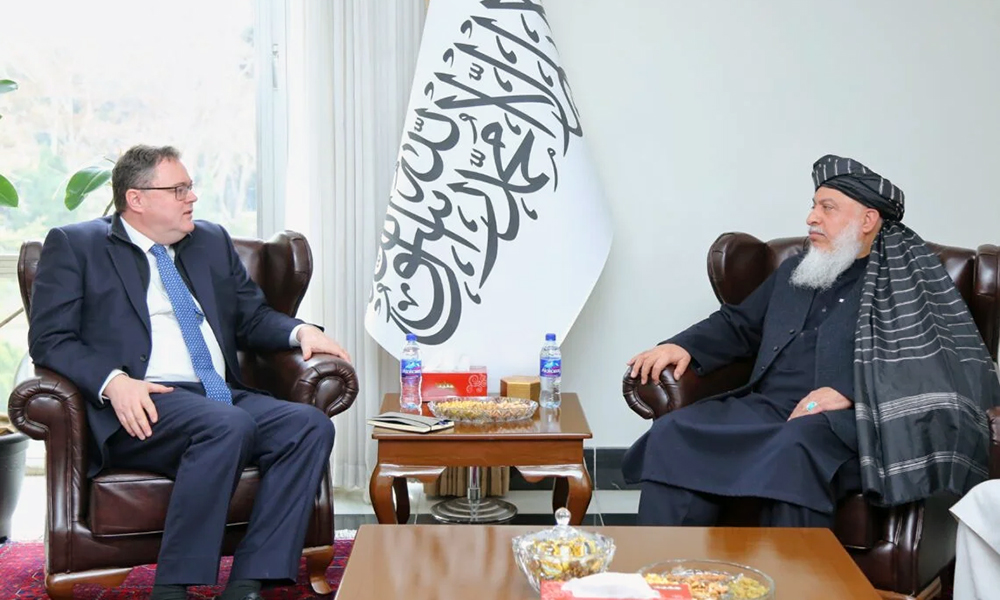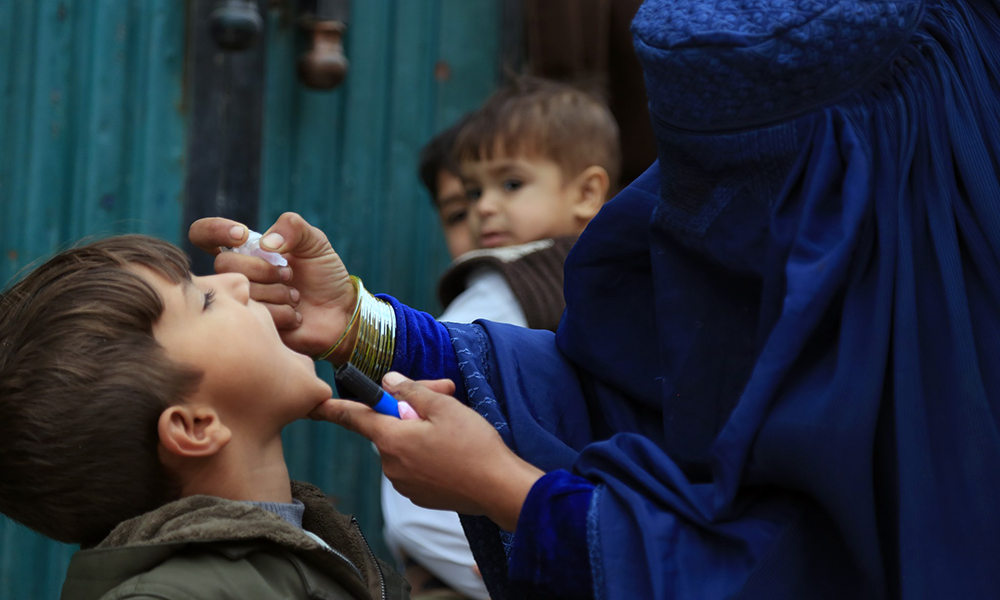Latest News
Taliban would roll back Afghan women’s rights -U.S. intelligence report

The Taliban "would roll back much" of the progress made in Afghan women's rights if the Islamist extremists regain national power, according to an assessment released on Tuesday by top U.S. intelligence analysts.
The U.S. National Intelligence Council report likely will reinforce fears that the Taliban will resume the harsh treatment that women and girls suffered under their 1996-2001 rule should the insurgents prevail in a full-blown civil war.
"The Taliban remains broadly consistent in its restrictive approach to women's rights and would roll back much of the past two decades of progress if the group regains national power," said the U.S. intelligence community's top analytical body.
At the same time, the council's "Sense of the Community Memorandum" said women's rights likely would be threatened after the U.S.-led military coalition withdraws, a finding reflecting the conservative nature of Afghanistan's male-dominated society.
"Progress (in women's rights) probably owes more to external pressure than domestic support, suggesting it would be at risk after coalition withdrawal, even without Taliban efforts to reverse it," the assessment said.
U.S. President Joe Biden's decision last month to withdraw the last 2,500 U.S. troops - triggering a pullout of other foreign forces - is fueling fears Afghanistan could plunge into an all-out civil war that could return the Taliban to power.
Those concerns have been stoked by a deadlock in U.S.-backed peace talks, while the Taliban have intensified attacks on government forces after a missed May 1 deadline for the U.S. troop departure.
Before being ousted by the 2001 U.S.-led invasion, the Taliban imposed a harsh version of Islamic rule that included barring girls from school and women from working outside their homes and prohibiting them from being in public without a male relative.
Women who violated those rules often suffered humiliation and public beatings by the Taliban's religious police.
The new report, however, noted that many of those practices have continued in government-controlled areas and "years of war have left millions of women maimed, widowed, impoverished and displaced."
Gains made in women's right have been touted as a major accomplishment during the 20 years that U.S.-led forces have been deployed, although mostly in urban centers.
The Biden administration has pledged to continue civilian assistance after U.S. troops depart, including to women's programs. But it has warned that Afghanistan would suffer isolation and sanctions if it backslides on human rights.
A February 2020, U.S.-Taliban accord struck by the Trump administration specified a May 1 deadline for completion of a U.S. troop withdrawal from America's longest war.
Biden, however, decided to complete the withdrawal before the anniversary of the Sept. 11, 2001, al Qaeda attacks on the United States that triggered the U.S.-led invasion.
Latest News
Eight Afghan migrants die as boat capsizes off Greek island

Eight Afghan migrants died after a speedboat carrying migrants capsized off Greece's eastern island of Rhodes on Friday, the Associated Press reported.
Greek authorities said that the capsizing was the result of the boat’s maneuvering to evade a patrol vessel.
A total of 18 migrants — 12 men, three women and three minors — all Afghan nationals, were rescued, Greece's coast guard said Saturday. The dead were also from Afghanistan, it said.
Some migrants remained hospitalized, with one in critical condition, authorities said.
Two Turkish citizens, ages 23 and 19, were arrested as the suspected traffickers. The boat sank after capsizing, the coast guard said.
The sinking off Rhodes was the second deadly incident involving migrants in the past week.
Seven migrants were killed and dozens were believed missing after a boat partially sank south of the island of Crete over the weekend — one of four rescue operations during which more than 200 migrants were rescued.
Latest News
Norwegian Chargé d’Affaires meets with IEA deputy foreign minister
Welcoming the diplomat’s visit to Kabul, Stanikzai underscored the importance of political relations between Afghanistan and Norway, the foreign ministry said in a statement.

The Norwegian Chargé d’Affaires for Afghanistan, Per Albert Ilsaas, on Saturday met with IEA’s Deputy Foreign Minister for Political Affairs, Sher Muhammad Abbas Stanikzai, in Kabul.
Welcoming the diplomat’s visit to Kabul, Stanikzai underscored the importance of political relations between Afghanistan and Norway, the foreign ministry said in a statement.
In addition to focusing on bilateral political, humanitarian, and other pertinent issues, the two sides expressed hope that continued engagement would lead to constructive solutions to related issues.
This comes two weeks after the Foreign Ministry Spokesman Abdul Qahar Balkhi expressed disappointment regarding the decision by the Norwegian government to downgrade diplomatic relations with Afghanistan.
Balkhi said in a post on X that such decisions should not be linked with internal affairs of other countries.
“Diplomatic engagement is most effective when it fosters mutual understanding and respect, even amidst differing viewpoints,” he stated.
“Access to consular services is a fundamental right of all nationals. We strongly urge all parties to prioritize this principle in the spirit of international cooperation,” he added.
Latest News
A new polio vaccination campaign is set to launch in Afghanistan
Afghanistan and Pakistan are the only two countries in the world where polio has not been eradicated.

The “Afghanistan Polio-Free” organization announced that a new round of polio vaccinations will begin on Monday, December 23, in various provinces of Afghanistan.
The organization did not specify which provinces will be targeted or how long the vaccination campaign will last.
Afghanistan and Pakistan are the only two countries in the world where polio has not been eradicated.
On December 4, 2023, the World Health Organization (WHO) issued a statement reporting a 283% increase in polio cases in Afghanistan. According to the WHO, the number of positive environmental samples for wild poliovirus type 1 in Afghanistan in 2024 reached 84, compared to 62 cases in 2023.
The Ministry of Public Health claimed in November 2024 that no new cases of polio had been reported in Afghanistan for the year.
-

 Sport4 days ago
Sport4 days agoZimbabwe’s opening ODI against Afghanistan abandoned
-

 World3 days ago
World3 days agoNorth Korean troops suffer 100 deaths, struggling in drone warfare, South Korea says
-

 Latest News3 days ago
Latest News3 days agoTwo horror accidents on Kabul-Kandahar highway leave 52 dead
-

 Latest News1 day ago
Latest News1 day agoAfghan men must stand with women to support viable future of country: US envoy
-

 Sport3 days ago
Sport3 days agoAfghanistan crush Zimbabwe by 232 runs in second ODI
-

 International Sports4 days ago
International Sports4 days agoLanka T10: Kandy Bolts in at 4th spot in playoffs after thrilling day
-

 Regional4 days ago
Regional4 days agoIran’s president to make rare visit to Egypt for D-8 summit
-

 Tahawol5 days ago
Tahawol5 days agoTahawol: Latest developments in Syria reviewed
























